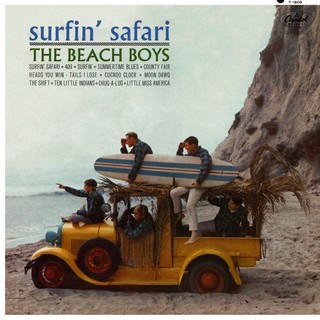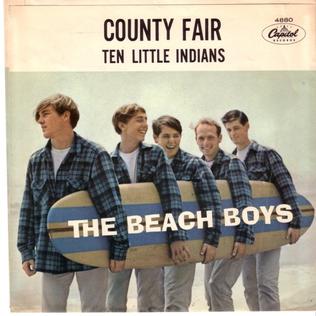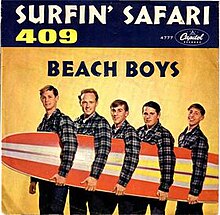
The Beach Boys are an American rock band formed in Hawthorne, California, in 1961. The group's original lineup consisted of brothers Brian, Dennis, and Carl Wilson, their cousin Mike Love, and friend Al Jardine. Distinguished by their vocal harmonies, adolescent-oriented lyrics, and musical ingenuity, they are one of the most influential acts of the rock era. They drew on the music of older pop vocal groups, 1950s rock and roll, and black R&B to create their unique sound. Under Brian's direction, they often incorporated classical or jazz elements and unconventional recording techniques in innovative ways.
Surf music is a genre of rock music associated with surf culture, particularly as found in Southern California. It was especially popular from 1958 to 1964 in two major forms. The first is instrumental surf, distinguished by reverb-heavy electric guitars played to evoke the sound of crashing waves, largely pioneered by Dick Dale and the Del-Tones. The second is vocal surf, which took elements of the original surf sound and added vocal harmonies, a movement led by the Beach Boys.

Bruce Arthur Johnston is an American singer, musician and songwriter who is a member of the Beach Boys. He also collaborated on many records with Terry Melcher and composed the 1975 Barry Manilow hit, "I Write the Songs".

David Lee Marks is an American guitarist who was an early member of the Beach Boys. While growing up in Hawthorne, California, Marks was a neighborhood friend of the original band members and was a frequent participant at their family get-togethers. Following his departure from the group, Marks fronted the Marksmen and performed and recorded as a session musician.

Carl Dean Wilson was an American musician who co-founded the Beach Boys. He was their lead guitarist, the youngest sibling of bandmates Brian and Dennis, and the group's de facto leader in the early to mid-1970s. He was also the band's musical director on stage from 1965 until his death.

Surfin' Safari is the debut studio album by the American rock band the Beach Boys, released October 1, 1962 on Capitol Records. The official production credit went to Nick Venet, though it was Brian Wilson with his father Murry who contributed substantially to the album's production; Brian also wrote or co-wrote nine of its 12 tracks. The album reached number 32 in the US during a chart stay of 37 weeks.

Surfin' U.S.A. is the second studio album by the American rock band the Beach Boys, released March 25, 1963 on Capitol Records. It reached number 2 in the US during a chart stay of 78 weeks, eventually being certified gold by the RIAA, and brought the group newfound national success. It was led by one single, its title track with the B-side "Shut Down". In the UK, the album was released in late 1965 and reached number 17.

Surfer Girl is the third studio album by the American rock band the Beach Boys, released September 16, 1963 on Capitol Records. It is largely a collection of surf songs. The LP reached number 7 in the U.S. and number 13 in the UK. Lead single "Surfer Girl", backed with "Little Deuce Coupe", was also a top 10 hit.

All Summer Long is the sixth album by American rock band the Beach Boys, released July 13, 1964 on Capitol Records. Regarded as their first artistically unified collection of songs, as well as one of the first true concept albums, it marked the Beach Boys' first LP that was not focused on themes of cars or surfing. Instead, the songs are semi-autobiographical and relate to the experiences of a typical Southern Californian teenager, a theme encapsulated by the title track, "All Summer Long", and the often-imitated front cover, a modernist style photo collage depicting the band members fraternizing with young women on a beach.

The Greatest Hits – Volume 1: 20 Good Vibrations is a compilation album of songs by American rock band The Beach Boys, released in 1995 by Capitol Records. The album features The Beach Boys' biggest hits from 1962-1966, but also includes the 1988 No. 1 hit "Kokomo".

The Honeys were an American girl group, formed in Los Angeles in 1958, that initially comprised sisters Marilyn, Diane, and Barbara Rovell. Barbara was later replaced by their cousin, Ginger Blake. After 1962, the Rovell Sisters were rechristened "the Honeys" by the Beach Boys' Brian Wilson, who envisioned the group as a female counterpart to his band. Wilson served as the Honeys' record producer and chief songwriter, and later married Marilyn in late 1964.

"Help Me, Rhonda" is a song by American rock band the Beach Boys, appearing first on their 1965 album The Beach Boys Today! and subsequently in re-recorded form on the following 1965 album Summer Days . It was written by Brian Wilson, with additional lyrics by Mike Love. Unlike many other songs by the band from this period, "Help Me, Rhonda" features a lead vocal sung by Al Jardine.

"Do You Want to Dance" is a song written by American singer Bobby Freeman and recorded by him in 1958. It reached number No. 5 on the United States Billboard Top 100 Sides pop chart and No. 2 on the Billboard R&B chart. Cliff Richard and the Shadows' version of the song reached No. 2 in the United Kingdom in 1962, despite being a B-side. The Beach Boys notably covered the song in 1965 for their album The Beach Boys Today!. Retitled "Do You Wanna Dance?", their version reached No. 12 in the United States. A 1972 cover by Bette Midler with the original title restored reached No. 17.

"Do It Again" is a song by the American rock band the Beach Boys that was released as a standalone single on July 8, 1968. It was written by Brian Wilson and Mike Love as a self-conscious callback to the group's earlier surf image, which they had not embraced since 1964. Love and Wilson also share the lead vocal on the song.

"409" is a song written by Brian Wilson, Mike Love, and Gary Usher for the American rock and roll band the Beach Boys. The song features Love singing lead vocals. It was originally released as the B-side of the single "Surfin' Safari" (1962). It was later released on their 1962 album Surfin' Safari, and appeared again on their 1963 album Little Deuce Coupe.
"Cuckoo Clock" is a song written by Brian Wilson and Gary Usher for the American rock band The Beach Boys. It was released on their 1962 album Surfin' Safari. The song was written about the myna bird of Brian's father Murry Wilson.
"Heads You Win–Tails I Lose" is a song written by Brian Wilson and Gary Usher for the American rock band The Beach Boys. It was released on their 1962 album Surfin' Safari.

"Ten Little Indians" is a song recorded by American rock band the Beach Boys. It was first released in October 1962 as the third track on the Beach Boys' debut album, Surfin' Safari.

"County Fair" is a song written by Brian Wilson and Gary Usher for the American rock band The Beach Boys. It was originally released as the second track on their 1962 album Surfin' Safari. On November 26 of that year, it was released as the B-side to The Beach Boys' third single, "Ten Little Indians". The same single was released in the UK in January 1963.

"Surfin' U.S.A." is a song by the American rock band the Beach Boys, credited to Chuck Berry and Brian Wilson. It is a rewritten version of Berry's "Sweet Little Sixteen" set to new lyrics written by Wilson and an uncredited Mike Love. The song was released as a single on March 4, 1963, backed with "Shut Down". It was then placed as the opening track on their album of the same name.















